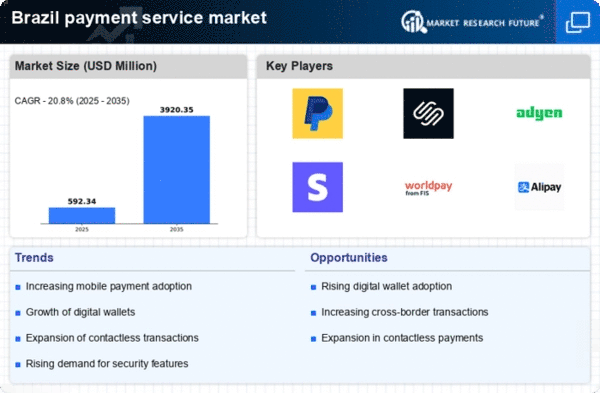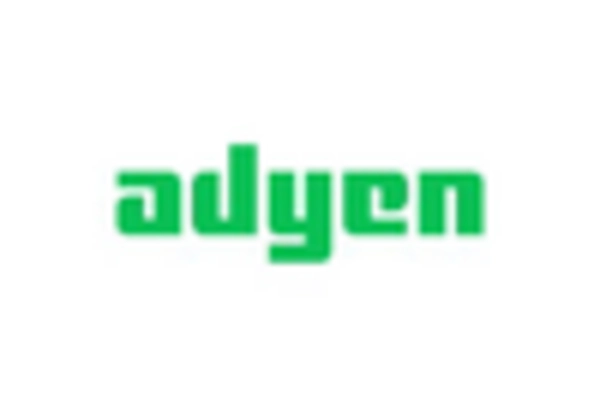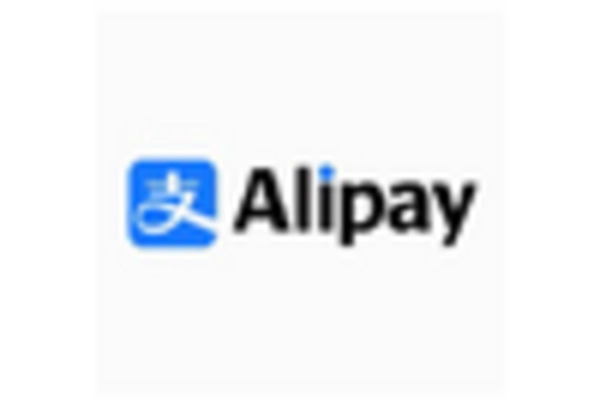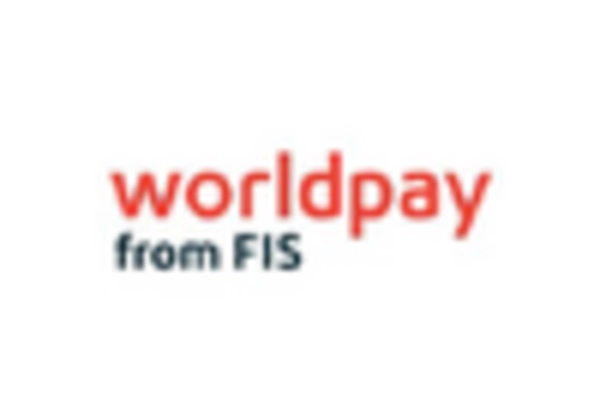Growing E-commerce Sector
The expansion of the e-commerce sector in Brazil is a pivotal driver for the payment service market. As more consumers turn to online shopping, the demand for efficient and secure payment solutions increases. In 2025, e-commerce sales in Brazil are projected to reach approximately $30 billion, reflecting a growth rate of around 20% from the previous year. This surge necessitates the integration of diverse payment methods, including credit cards, digital wallets, and bank transfers, to accommodate consumer preferences. Consequently, payment service providers are compelled to innovate and enhance their offerings to capture this burgeoning market. The increasing reliance on digital transactions underscores the importance of seamless payment experiences, thereby propelling the growth of the payment service market in Brazil.
Rising Smartphone Penetration
The increasing penetration of smartphones in Brazil is a crucial driver for the payment service market. As of November 2025, approximately 85% of the Brazilian population owns a smartphone, facilitating access to mobile payment solutions. This trend is particularly pronounced among younger demographics, who are more inclined to utilize digital wallets and mobile banking applications. The convenience of making payments via smartphones is reshaping consumer behavior, leading to a decline in cash transactions. In 2025, mobile payments are expected to account for nearly 40% of all payment transactions in Brazil, highlighting the transformative impact of mobile technology on the payment service market.
Regulatory Support for Fintech
Brazil's regulatory environment is increasingly supportive of fintech innovations, which serves as a significant driver for the payment service market. The Central Bank of Brazil has implemented measures to foster competition and enhance consumer protection, such as the introduction of the Open Banking initiative. This initiative allows consumers to share their financial data with authorized third parties, promoting transparency and encouraging the development of new payment solutions. As of November 2025, the number of fintech companies operating in Brazil has surged, with over 800 registered entities, indicating a vibrant ecosystem. This regulatory support not only stimulates innovation but also attracts investment, further bolstering the payment service market.
Consumer Demand for Convenience
The evolving consumer preferences in Brazil are driving the demand for convenience in payment solutions, significantly impacting the payment service market. As consumers increasingly seek quick and hassle-free payment experiences, service providers are compelled to adapt. Features such as one-click payments, automated billing, and instant fund transfers are becoming essential. In 2025, surveys indicate that over 70% of Brazilian consumers prioritize convenience when selecting payment methods. This shift in consumer behavior is prompting payment service providers to enhance their platforms, ensuring they meet the expectations of a tech-savvy population. The focus on convenience is likely to continue shaping the landscape of the payment service market.
Increased Focus on Financial Inclusion
The drive towards financial inclusion in Brazil is a significant factor influencing the payment service market. With a considerable portion of the population still unbanked or underbanked, there is a growing emphasis on providing accessible payment solutions. Initiatives aimed at integrating marginalized communities into the financial system are gaining traction, with mobile payment platforms and digital wallets playing a crucial role. As of November 2025, it is estimated that around 30% of Brazilians remain outside the traditional banking system, highlighting the potential for growth in the payment service market. By addressing the needs of these underserved populations, payment service providers can expand their customer base and contribute to broader economic development.
















